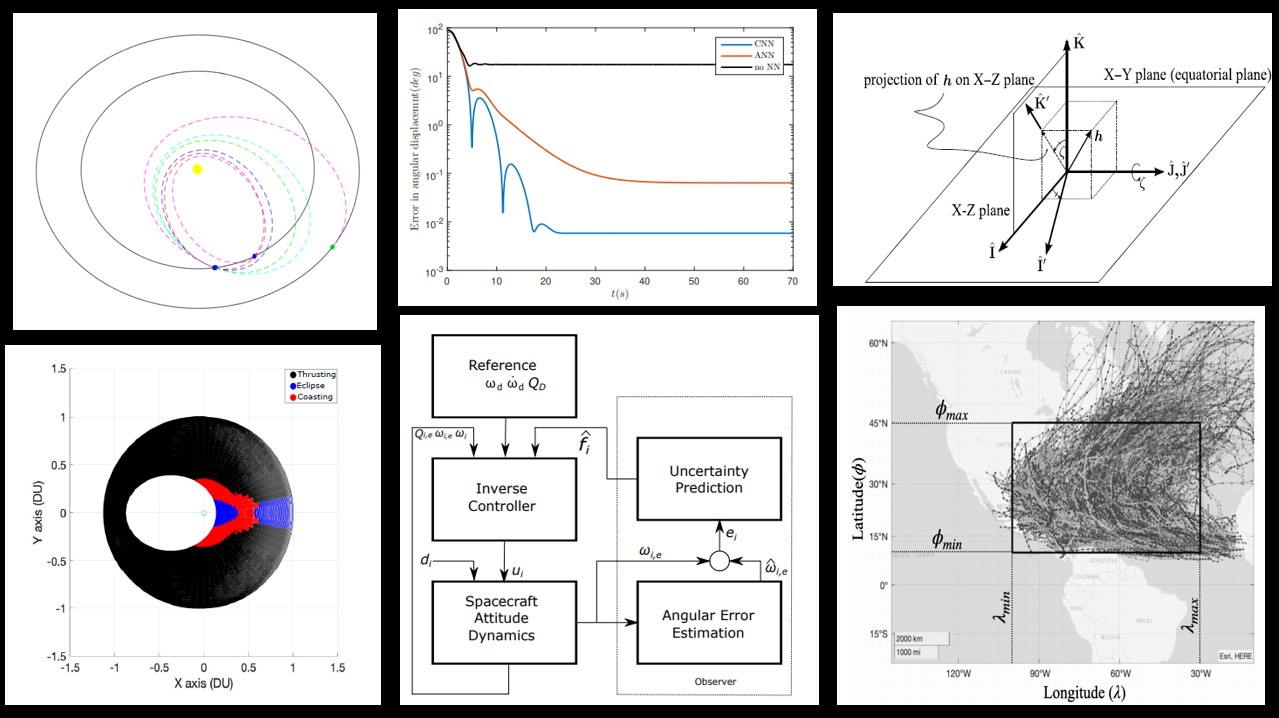HURRICANE MONITORING
Our laboratory had been investigating CubeSat constellation design for tracking of large-scale weather phenomenon such as hurricanes.
Publications
Regional CubeSat Constellation Design for Monitoring Hurricanes
Abstract: State-of-the-art weather forecasting systems depend on a variety of data collected by airborne, orbiting, and ground sensors. Regional CubeSat constellations have the potential to improve hurricane forecasting by collecting sensor data over data-starved oceanic regions. Even in regions where strong terrestrial sensor networks exist, constellation sensor data can help reduce forecasting model errors. To this end, the article considers the problem of designing a low-earth orbit CubeSat constellation that meets given resolution requirements over a region of interest. We propose a novel optimization framework that uses the concept of satellite coverage maps to determine the number of satellites and constellation pattern. Numerical simulations are presented for asymmetric constellation design that can provide sensor data over important geographical regions within a specified repeated time window.
CubeSat Formations for Monitoring Hurricanes
Recent technological advancements have enabled distributed sensing of major weather events such as hurricanes using CubeSats. This paper proposes three novel formation flying concepts of operations to improve the hurricane forecast accuracy by filling the current observation gaps. The first concept leverages the use of non-Dopplerized precipitation radars, while the second concept envisions the use of Dopplerized precipitation radars in formation. Both formation designs enable the collection of simultaneous multi-frequency data, with different constituent CubeSats operating at different frequencies. The third formation concept leverages the use of non-Dopplerized precipitation radars, each operating at a different frequency, flying in formation with a synthetic aperture radar (SAR) in a multi-static configuration. The paper presents the concepts of operations for each formation and conducts mission analysis for relevant operational needs. Specifically, we determine the safe (no collision) and efficient relative orbits designed by considering J2 perturbations for the proposed formation designs. Furthermore, we conduct a performance comparison, focusing on formation initialization as well as formation-keeping cost.
Miniaturized precipitation radars deployed on CubeSats have the potential to significantly improve hurricane forecasting by collecting measurements over data-starved regions and by complementing the existing sensor infrastructure in other places. The use of narrow-swath sensors typically lead to the deployment of hundreds of CubeSats in a constellation to meet the spatial and temporal needs needs of state-of-the-art weather forecasting systems. To this end, this paper investigates the effect of orbital perturbations on the performance of such a constellation measured by the coverage it provides over a designated geographical area. In addition, we determine the station-keeping requirements of constituent CubeSats in order to counteract the effect of fourth-order geopotential perturbations and atmospheric drag. Using numerical simulations, we have quantified the effects for a 240 satellite constellation observing the mainland United States and the Atlantic basin.
Presentations
Data-Driven Hazard Detection and Prediction For Disaster Risk Reduction
Atri Dutta*, Zelalem Demissie, Mara Alagic
Regional Constellation Design to Monitor Hurricanes Using Cubesat Coverage Maps
Pardhasai Chadalavada*, Atri Dutta
CubeSat Constellation Design to Monitor Hurricanes over Southeastern Coastal Areas of the United States
Pardhasai Chadalavada*, Atri Dutta
Funding Acknowledgment
NASA Future Investigators in NASA Earth and Space Science and Technology (FINESST) Program, 2019 - 2023, Grant number: 80NSSC19K1375. Future Investigator: Pardhasai Chadalavada.


